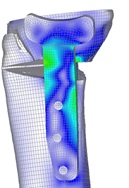PAK-B
A General Purpose Finite Element Program for Biomechanics
- Blood flow through arteries
- Pulsatile non-Newtonian blood flow in 3-D human carotid bifurcation model
- Wall shear stresses during the pulse cycle
- Non-Newtonian viscosity: Casson model, Shear-thinning model of blood
- Fluid-structure interaction (blood flow-wall artery motion), ALE formulation
- Mixed and penalty formulation of Naiver-Stokes equation
- Large block implicit solver, three-step Taylor-Galerkin method for fluid
- Geometrically nonlinear shell theory for wall artery motion
- Flow separation, flow recirculation zones – correlation between fluid dynamics and blood platelet deposition
- Numerical and experimental simulation of real model of carotid bifurcation

- Cartilage mechanics with electrokinetic coupling
- Linear and non-linear analysis of solid
- Statics and dynamics
- Variation of porosity
- Human spinal motion segments – intervertebral disk
- Electromechanical coupling, streaming potential calculation
- Swelling pressure effects determined through, ionic diffusion, change of water content, electrical potential
- Models for muscles and connective tissue
- Hill’s three componential material model for muscle
- Nonlinear models for organs walls based on experimentally determined stress-stretch relations, for passive (including creep) and active conditions
- A fiber-fiber kinetics model for connective tissue
